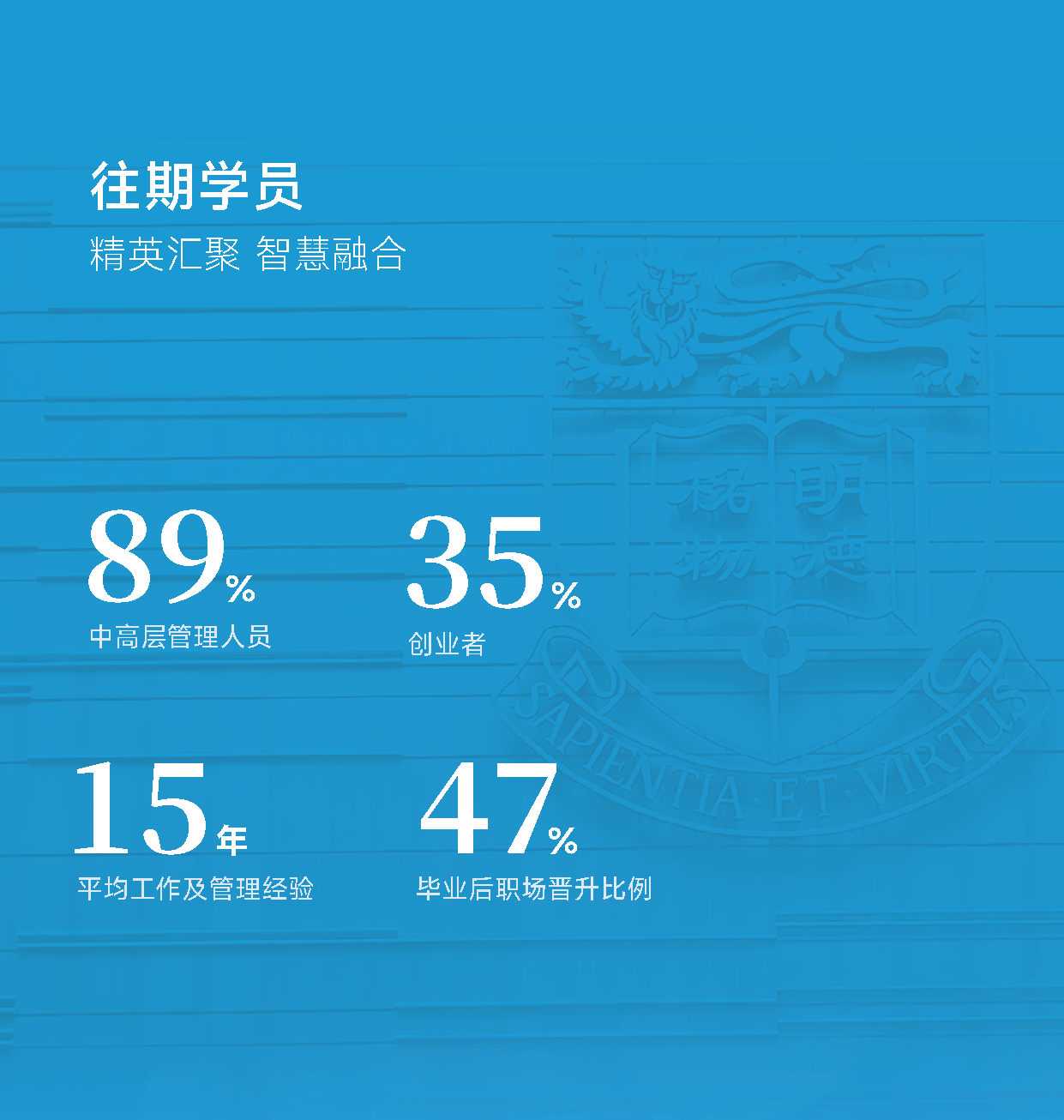Frequently Asked Questions
Founded in 1911, the University of Hong Kong (HKU) is the oldest institution of higher education in Hong Kong and an internationally acclaimed institution of higher education. HKU has been ranked 11th globally in the 2026 QS World University Rankings and 2nd in the 2025 QS Asia University Rankings, and is a pioneer in "lifelong learning" in Asia, with research, teaching, and knowledge transfer as its three main directions.
The HKU Institute for China Business (HKU ICB) promotes interdisciplinary professional studies with "the depth of professionalism, breadth of knowledge, and height of future development" as the direction and goal of nurturing talents, which is in line with the founding slogan of HKU --- "Establishing for China".
To better support Mainland China's economic development and meet the needs of executives seeking further education, HKU ICB has launched a series of part-time Professional and Senior Executive Postgraduate Diploma programmes, targeting the trends and needs of Mainland China's development, and has repeatedly become a leader in many interdisciplinary professional programmes. Over the past decade, HKU ICB has nurtured more than 18,000 senior management talents with outstanding strategic thinking, in-depth professional knowledge, and a broad international perspective.
Based on HKU's 100 years of academic accumulation and the learning characteristics of administrators in Mainland China, HKU ICB advocates the "3-3-3" open learning model; emphasises the "4P" education philosophy of "Professional, Prospective, Practical, and Problem-solving"; insists on the "5i" talent-nurturing philosophy of independence, innovation, internationalisation, integrity, and impact, with emphasis on vertical thinking and interdisciplinary integration, aiming to nurture the interdisciplinary talents needed in the 21st century.
Based on the concept of interdisciplinary professional education, HKU ICB offers a series of part-time Professional and Senior Executive Postgraduate Diploma programmes, which are dedicated to developing students’ practical business management skills and growth-oriented innovative thinking.
[Postgraduate Diploma programmes for working professionals]
PgDip in Consumer Psychology and Intelligent Marketing (CPIM)
(消费者心理学与智能营销)
PgDip in Digital Transformation and Business Strategy (DTBS)
(数字化转型与企业战略)
PgDip in Finance and Business Management (FBM)
(金融与商业管理)
PgDip in Financial Markets and Portfolio Management (FMPM)
(金融市场与投资组合管理)
PgDip in Integrated Marketing Communications (IMC)
(整合营销传播)
PgDip in Integrated and Practicing Management (IPM)
(整合实效管理)
PgDip in Managerial Psychology (MPSY)
(管理心理学)
PgDip in Product Innovation and Service Design (PISD)
(产品创新与服务设计)
PgDip in Strategic Human Resource Management (SHRM)
(战略人力资源管理)
[Senior Executive Postgraduate Diploma programmes]
PgDip in Culture and Creativity Management (CCM)
(文化创意产业管理)
PgDip in Enterprise Expansion & Risk Management (EERM)
(企业扩张与风险管理)
PgDip in Healthcare Management (HCM)
(医疗健康产业管理)
PgDip in Innovative Marketing & Agile Organization (IMAO)
(创新营销与敏捷组织)
PgDip in Organisational Development and Change Management (ODCM)
(组织发展与变革管理)
PgDip in Public Financing and Capital Market (PFCM)
(上市融资与资本市场)
A Postgraduate Diploma is an applied postgraduate diploma awarded by higher education institutions in the former Commonwealth countries or regions (UK, Canada, Australia, New Zealand, Singapore, Ireland, Hong Kong China), and is abbreviated as PgD or PgDip in English.
As a formal academic qualification, the Postgraduate Diploma awards credits in the same way as a Master's degree does, and the credits between the two are often interchangeable as they are of the same academic standard. It should be noted, however, that credit exemptions (or exemptions from the number of credits) generally depend on at least four factors: firstly, the relevance of the programme speciality; secondly, the applicant's academic performance and command of the subject; thirdly, the time lapse between the two programmes; and fourthly, the laws, regulations and policies of the university and the country or region in which it is offered. In accordance with international practice, it is more possible to obtain credit exemptions within a three-year gap. However, the final decision on whether to grant credit exemptions will be made by the university to which the applicant has applied.
Looking at the evolution of postgraduate education worldwide, master's degree programmes have further evolved into research-based master's degree programmes and applied master's degree programmes. In general, master's degree programmes are academic in nature and focus on demonstrating the professional academic competence of the holder, while postgraduate diploma programmes are application-oriented and focus on demonstrating the professional application of the holder. Many of the emerging interdisciplinary practical and applied disciplines start with a postgraduate diploma programme, and only after academic research has developed a theoretical system do they launch the applied and research-based programmes that lead to a master's degree.
The Postgraduate Diploma programmes for working Professionals are on a Part-time Weekend Mode, with one intensive module on a weekend (Saturday and Sunday) each month. The entire programme will be completed in approximately 18 months. The programmes will be held in the learning centres in Mainland China. All students will attend the Inauguration Ceremony-cum-Residential Workshop. To enhance students' learning experience and create an enriching communication and sharing platform, the Institute will make appropriate arrangements for students to attend classes at different learning centres.
The Senior Executive Postgraduate Diploma programmes are on a Part-time Weekend Mode, with 2.5 days per session (Friday, Saturday, and Sunday), the overall programme will be completed in approximately 15 months. The programmes will be held in Hong Kong and overseas, with Chinese and English bilingual teaching (English classes with simultaneous interpretation in Putonghua). Students are required to attend the Residential Workshop before the commencement of the programmes. To enhance students' learning experience and create an enriching communication and sharing platform, the Institute will make appropriate arrangements for students to attend classes at different learning centres.
Due to pandemic and/or other force majeure factors, the Institute reserves the right to adjust the teaching schedule, including the location and inauguration of the programme, etc.
The HKU ICB programmes focus on case study and classroom interaction. In addition, a variety of teaching models are used, including group discussions, contextual experiences, real-life simulations, and experience-based teaching.
Classes are taught in Chinese (Putonghua), supplemented with English, and lecture materials are mainly in Chinese. Assignments, examinations, and final projects can be completed in either Chinese or English.
After completing all the compulsory modules, students are required to complete a "Final Project" to be qualified for graduation. The project consists of an oral presentation and a written report, which is to be completed in groups. Each group of students is required to propose a systematic and feasible practical solution based on the requirements of the project, considering the knowledge and tools learnt in the programme. The group will need to write a project report according to the specifications and present the proposal through a defence in person.
Admissions to the HKU ICB programmes are offered in Beijing, Shanghai, Shenzhen, Guangzhou, and Chengdu in Spring and Autumn each year. The inauguration dates of different programmes vary, so please submit your application before the required application deadline. Please refer to the relevant programme description page for details.
Feel free to call us for application information at: Beijing: 010-8518 5526, Shanghai: 021-6841 1267, Shenzhen: 0755-2360 6173, Guangzhou: 020-2206 0513, Chengdu: 028-8445 7096.
The application fee for the Postgraduate Diploma programmes for working professionals is RMB 500. The exact programme tuition fees can be found on the page of programme details.
The exact programme tuition fees for the Senior Executive Postgraduate Diploma programmes can be found on the page of programme details.
Our faculty members are accomplished business leaders with many years of management experience in Mainland China, Hong Kong, and other parts of the world. They have a forward-looking, international perspective and extensive local practical experience, and make excellent contributions to professional teaching and academic research, making them "good mentors" for students on their lifelong learning journey. 30% of them are full-time lecturers from the University of Hong Kong or professors from renowned overseas universities, and 70% are senior executives from multinational companies with more than 15 years of professional management experience.
[Postgraduate Diploma programmes for working professionals]
A minimum of 3 years' relevant work experience for those with a Bachelor's degree or above.
For those with a tertiary qualification, a minimum of 5 years' relevant work experience is required.
[Senior Executive Postgraduate Diploma programmes]
A minimum of 10 years' relevant work experience for those with a Bachelor's degree or above.
Hold a senior management position within the organisation and obtain recommendation and support or sponsorship from an organisation.
In addition to the above requirements, applicants will be admitted on the basis of merit, taking into account their fundamental qualities, educational background, professional experience and work achievements to maintain the high quality of the programme, the high standard of the students, and to maximise the benefits of their studies at HKU ICB. More specific requirements can be found on the page of programme details.
Complete and submit the application form and upon completion, submit the required supporting documents to the Institute by post or email.
Please refer to the application guidelines for details.
[Application Guidelines for Professional Postgraduate Diploma programmes]
[Application Guidelines for Executive Postgraduate Diploma programmes]
No. Applicants without any work experience will not be considered.
No, deferrals are normally not allowed. If an applicant is unable to start at the time stated in the “Letter of Acceptance”, a new application will be required. In certain exceptional circumstances, an admitted student may be able to apply for a one-year deferral for personal reasons. Please consult our admissions colleagues for specific details.


